|
|
|
Sort Order |
|
|
|
Items / Page
|
|
|
|
|
|
|
| Srl | Item |
| 1 |
ID:
091433
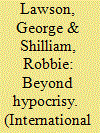

|
|
|
|
|
| Publication |
2009.
|
| Summary/Abstract |
It is no exaggeration to say that sovereignty is the foundation both of International Relations (IR) as a field of enquiry and of international politics as an 'actual existing' field of practice. Whether seen as the archetypal IR101 topic or in debates about the rights and wrongs of humanitarian intervention, the capacity of international organisations to exert control over significant spheres of international politics, or in discussions about the legitimacy of bodies such as the International Criminal Court, sovereignty appears as the central referent point of international politics. Over recent years, however, there has been considerable debate over both the substantive content ('fact') and normative framing ('value') of sovereignty. The former comes about as a result of a series of political, economic and security challenges which see states as assuming a role as 'one-amongst-many' in an increasingly complex international topography; the latter stems from concerns about whether national states form the optimal site for the articulation of authority claims. This forum engages with both of these debates, focusing on how they relate to understandings of the emergence, development and possible emasculation of sovereignty in the contemporary world. In the introduction to the forum, we outline the ways in which scholars have contested the emergence of the sovereign state and examine the ethical issues surrounding the normative value of this form of rule. In the process, we lay out the ways in which the papers that make up this forum make uncomfortable, if important, contributions to the debate about the fact and value - or 'is' and 'ought' - of sovereignty in contemporary world politics.
|
|
|
|
|
|
|
|
|
|
|
|
|
|
|
|
| 2 |
ID:
158668
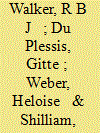

|
|
|
|
|
| Summary/Abstract |
As students and scholars of global politics, we have been witnessing, participating in, and feeling the effects of recent global upheavals. These include specific events, such as the election of Trump and the vote for Brexit, but are better understood through their resulting political effects (e.g., pushing back on migration, hardening national borders, denying climate change, reneging on trade deals, gutting the welfare state, increasing resource extraction, and curtailing rights). Commentators refer to these upheavals in different ways: a rise in populism, reinvigorated nationalism, the new fascism, a polarization of Right and Left, the end of globalization, and posttruth politics. These labels have not only generated a great deal of scholarly debate, they have also helped generate multiple energies, including activism, protest, and politicization. Such developments feel at once totally unprecedented but also eerily familiar. More to the point, they have very different manifestations in different parts of the world; indeed, one of the difficulties of the present moment is the lack of analysis about the global ramifications of these upheavals.
|
|
|
|
|
|
|
|
|
|
|
|
|
|
|
|
| 3 |
ID:
105927


|
|
|
|
|
| Publication |
2011.
|
| Summary/Abstract |
In this article I seek to decolonise the grounding of dialogue within the Europe-modern condition. I do so by working through two authors who are indispensable to the current canon of IR theory, Immanuel Kant and Michel Foucault, and one author who is largely missing from the canon, Édouard Glissant, the Martiniquean poet and literary critique. With regards to Kant and Foucault, I show how within both there exists at the same time a strong endorsement of the policing of ethical inquiry on the grounds of the European-modern and a weaker resistance to it. With regards to Glissant, I focus on his set of essays entitled Caribbean Discourse to show how he strongly endorses a relational pluralising of the grounds of ethical inquiry while at the same time retaining a weaker accommodation to the European-modern. In the course of these discussions I present each author's assessment of an adequate ethical faculty in the form of a figure: in Kant, the enlightened philosopher; in Foucault, the creative work of art; and in Glissant, the maroon. In the final section I rehearse a dialogue amongst the three figures that opens up the grounds of ethical inquiry to decolonising impulses.
|
|
|
|
|
|
|
|
|
|
|
|
|
|
|
|
| 4 |
ID:
082745
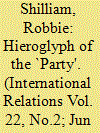

|
|
|
|
|
| Publication |
2008.
|
| Summary/Abstract |
Questions about the agency of the Communist Party - especially its failure to effect and support radical social transformations - formed one crucial aspect of the socio-political context in which the agent-structure debate was rejoined by social scientists in the 1960s and 70s. Moreover, the Party had long existed as a hieroglyph for Marxist thought. And deciphering the historical importance of the Party in processes of world development required the theorisation of an inter-societal dimension to the agent-structure problem. I contend that using an Ideas in Context approach to the agent-structure debate in order to consider this pre-existing Marxist literature on the agency of the Party illuminates issues obscured in the progress of the debate in IR. To this effect I examine the seminal writings of Trotsky, C. L. R. James and Althusser in order to reveal how the debate, imported into IR in the late 1980s, was already framed by the problem of analytically and ethically coming to terms with the inter-societal dimension of socio-political transformation, especially when this dimension pushed to the fore the generative nature of inter-societal alterity manifested in the condition of - and `advantage' of - comparative backwardness. Crucially, the attempts made to decipher the hieroglyph of the Party are instructive in that they reveal foundational challenges for the intellectual production of knowledge of inter-societal alterity and its centrality to issues of continuity and change, the identification of structural constraints and sources of transformative agency
|
|
|
|
|
|
|
|
|
|
|
|
|
|
|
|
| 5 |
ID:
101572
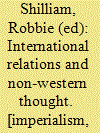

|
|
|
|
|
| Publication |
London, Routledge, 2011.
|
| Description |
xvi, 268p.
|
| Series |
Interventions
|
| Standard Number |
9780415577724, hbk
|
|
|
|
|
|
|
|
|
|
|
|
Copies: C:1/I:0,R:0,Q:0
Circulation
| Accession# | Call# | Current Location | Status | Policy | Location |
| 055628 | 327.101/SHI 055628 | Main | On Shelf | General | |
|
|
|
|
| 6 |
ID:
124134


|
|
|
|
|
| Publication |
2013.
|
| Summary/Abstract |
In this article I utilise the editors' conceptual frame of sovereignty/intervention/transnational social forces to argue that the relationship that ensues between these phenomena has to be understood in colonial-modern - rather than modern - terms. I thereby argue that intervention is a distinctive technology of colonial-modern rule, specifically, one that erects and polices the difference between sovereign and quasi-sovereign entities via a standard of civilisation. Additionally, I argue that transnational social forces struggle - cognitively, socially, and politically - over the upholding or refuting of this standard; and in this struggle, some might even defend particular sovereign entities against colonial interventions. I demonstrate my argument by explicating the global colonial context of the Italy/Ethiopia conflict in 1935-6, the nadir of the interwar crisis. I 'decolonise' received interpretations of the conflict through the heuristic of two differing catechisms of Psalms 68:31 proffered at the time: one, invoking a civilising mission of Africans; the other, invoking a project of self-liberation by Africans.
|
|
|
|
|
|
|
|
|
|
|
|
|
|
|
|
| 7 |
ID:
079482
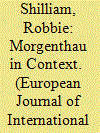

|
|
|
|
|
| Publication |
2007.
|
| Summary/Abstract |
By what criteria might the human condition be considered `tragic'? In this article I argue that historically contextualizing the criteria by which Morgenthau judged the human condition to be tragic requires a sensitivity to what might be called the `international dimension' of knowledge production. Specifically, I argue that Morgenthau's tragic sense of the relation between liberal ethics and the reality of politics was constructed as a reaction to a preceding set of intellectual engagements - exemplified by the political philosophies of Georg Hegel and Max Weber - with the perceived `backward' nature of the `liberal' project in Germany in comparison to that of republican France and capitalist Britain. Through this investigation I argue that inter-societal difference is not simply an object of political theory, but at a deeper level generative in the historical construction of that thought itself. This argument has implications for Morgenthau's recent resurrection as a critical voice on the separation of ethics and politics in International Relations theory
|
|
|
|
|
|
|
|
|
|
|
|
|
|
|
|
| 8 |
ID:
120451
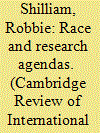

|
|
|
|
|
| Publication |
2013.
|
| Summary/Abstract |
In this afterword I consider a set of questions related to the research agendas of race in International Relations. What are our narratives of race and racism? Whom do we follow in order to tell the tale: the masters or the enslaved-the humanitarians or the 'sufferers'? And which tale confesses the episteme-the scientifically valid study-of race?
|
|
|
|
|
|
|
|
|
|
|
|
|
|
|
|
| 9 |
ID:
153664
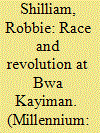

|
|
|
|
|
| Summary/Abstract |
It is no longer remarkable to claim that, out of all the revolutions in the making of the modern world order, the Haitian Revolution was the most radical and remains the most challenging to Euro-Western narratives. The Haitian Revolution did what no other did – end slavery – in an age when white Europeans and North Americans spoke of natural rights and freedoms while they remained traffickers and brutal exploiters of African flesh. The stakes at play are significant: To theorise and narrate the Haitian Revolution is to necessarily take part in a struggle over the authorship of the meaning of global justice and modern freedoms. But as we deepen our understandings of the Revolution we must grapple more audaciously with the intellectual strictures that have in various ways ‘silenced’ these struggles of enslaved Africans. Race informs these silencings. Fundamentally, race silences the response to slavery. In this article, I return to Bwa Kayiman – the meeting that inaugurated a world-shaking response.
|
|
|
|
|
|
|
|
|
|
|
|
|
|
|
|
| 10 |
ID:
094556
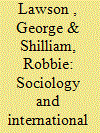

|
|
|
|
|
| Publication |
2010.
|
| Summary/Abstract |
While sociological concepts have often been implicitly used in International Relations (IR), recent years have seen a more explicit engagement between IR and Sociology. As with any such interdisciplinary assignation, there are both possibilities and challenges contained within this move: possibilities in terms of reducing IR's intellectual autism and opening the discipline towards potentially fertile terrain that was never, actually, that distant; challenges in that interdisciplinary raiding parties can often serve as pseudonyms for cannibalism, shallowness and dilettantism. This forum reviews the sociological turn in IR and interrogates it from a novel vantage point-how sociologists themselves approach IR concepts, debates and issues. Three sociological approaches-classical social theory, historical sociology and Foucauldian analysis-are critically deployed to illuminate IR concerns. In this way, the forum offers the possibility of (re)establishing exchanges between the two disciplines premised on a firmer grasp of social theory itself. The result is a potentially more fruitful sociological turn, one with significant benefits for IR as a whole.
|
|
|
|
|
|
|
|
|
|
|
|
|
|
|
|
| 11 |
ID:
073679
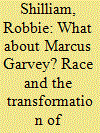

|
|
|
|
|
| Publication |
2006.
|
| Summary/Abstract |
Post World War I, Marcus Garvey's Pan-African movement managed to coalesce, however briefly and imperfectly, an extra-territorial sovereign authority in the form of the Universal Negro Improvement Association (UNIA). Through the recollection of this project the article seeks to disturb the predominant uni-linear narrative in IR debates of the transformation of sovereignty that posit a recent shift from territorial exclusivity to multi-level governance encapsulated in the emergence of the European Union. By narrating a string of transformations of sovereignty that led to Garvey's UNIA the case is made that such transformations have not directly followed one universal logic but have been multi-linear in character, and further, extra-territoriality has been a defining principle of sovereignty in the modern epoch and by no means peculiar to the contemporary European milieu. Through exploring the generative relationship between capitalist, nationalist and racialist forms of sovereignty the article contributes theoretically and empirically to a historical sociology adequate to capture the multiple, yet related, transformations of sovereignty in the modern epoch.
|
|
|
|
|
|
|
|
|
|
|
|
|
|
|
|
|
|
|
|
|